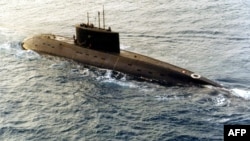India has given a submarine to Myanmar as part of a military outreach to its eastern neighbor that strategic analysts say is driven by New Delhi’s bid to counter China’s growing influence in Southeast Asia.
“Cooperation in the maritime domain is a part of our diverse and enhanced engagement with Myanmar," Indian External Affairs Ministry spokesman Anurag Srivastava said while announcing earlier this month that India is giving its neighbor its first submarine — a 3,000-ton diesel-electric, Kilo class Russian-built submarine that has been refitted.
Renamed UMS Minye Theinkhathu, a historical hero in Myanmar, the attack submarine was showcased in a naval exercise conducted by the Myanmar navy in mid-October. It can operate at a depth of up to 300 meters.
The submarine, the first supplied by India to any country, is part of an effort by New Delhi to step up its defense engagement with Myanmar as it tries to contain China’s looming presence in a country that is a gateway to the Bay of Bengal, a strategic waterway located in the northeastern part of the Indian Ocean.
India and Myanmar share a 725-kilometer maritime boundary in the Bay of Bengal.
India’s decision to give an underwater vessel to its eastern neighbor comes four years after Bangladesh, which shares a border with both India and Myanmar, acquired two submarines from China. Beijing is also helping Bangladesh build a submarine base, funding the development of its Chittagong port and developing a deep-sea port in Kyaukpyu in Myanmar on the Bay of Bengal.
Analysts say that for New Delhi these projects represent yet another bid by China to expand its naval presence in countries that ring India, prompting it to strengthen its own partnerships in the region.
“Myanmar wants to reduce its military and economic dependence on Beijing, but in order to do that they have pointed out that they need options,” according to Pankaj Jha, a professor of defense and security studies at India’s O.P. Jindal Global University.
“We have given them defense equipment earlier, such as naval surveillance aircraft and communication equipment which was nonlethal in nature. But recently they have been seeking more advanced equipment. So, giving a submarine is part of India’s decision to engage Myanmar much more cohesively, to build goodwill,” he said.
Myanmar’s acquisition of a submarine comes amid a spree in recent years by small Asian countries, from Bangladesh to Vietnam, to acquire underwater capability as they seek to modernize their navies — viewed as an effort by the export-dependent countries to ensure open sea lanes.
“Tensions in recent years have been rising along maritime borders,” Jha said.
“And many of the small countries now believe that submarines represent a technological upgrade for their navies and give them some biting power,” he said.
The website of Myanmar’s military's commander in chief, Senior General Min Aung Hlaing, says the submarine will enhance the state’s defense prowess.
"To be a more modernized navy, we must be facilitated with submarines,” the website said.
India’s move, according to ministry spokesman Srivastava, was in accordance with its vision “to build capacities and self-reliance in all our neighboring countries." India’s army chief, Manoj Mukund Naravane, and Foreign Secretary Harsh Vardhan Shringla visited Myanmar this month.
“Seventy to 80% of the world’s trade passes through the Indian Ocean and the Chinese have invested in countries like Myanmar, Pakistan, Maldives and Sri Lanka, that are all gateways to the Indian Ocean,” defense analyst Rahul Bedi said.
“India’s giving a submarine to Myanmar is a small cog in the much, much bigger wheel of acquiring a dominant position in these crucial waters,” he said.





